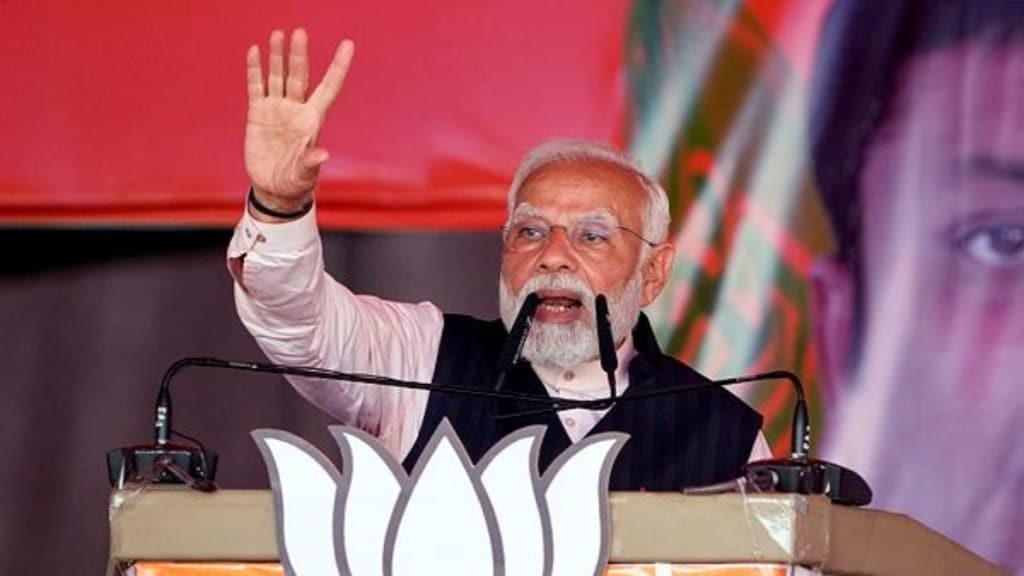Prime Minister Narendra Modi on Friday dedicated to the nation and laid the foundation stone for multiple development projects worth Rs 7,200 crore in Arambagh, Hooghly, West Bengal. The developmental projects of today are associated with sectors like rail, ports, oil pipeline, LPG supply and wastewater treatment.
Which projects did PM Modi inaugurate in West Bengal?
The Prime Minister unveiled Indian Oil’s Haldia-Barauni Crude Oil Pipeline, stretching over 518 kilometers, with a development cost of approximately Rs 2,790 crore. This pipeline traverses through Bihar, Jharkhand, and West Bengal. It is designed to supply crude oil to Barauni Refinery, Bongaigaon Refinery, and Guwahati Refinery, ensuring safe, cost-effective, and eco-friendly transportation.
Additionally,he unveiled Indian Oil’s LPG Bottling plant, boasting a capacity of 120 TMTPA, located at Vidyasagar Industrial Park, Kharagpur. This state-of-the-art facility, constructed at a cost exceeding Rs 200 crore, marks the region’s first LPG bottling plant. It is set to cater to approximately 14.5 lakh customers in West Bengal with uninterrupted LPG supply.
The Prime Minister inaugurated and laid the foundation stone for a series of infrastructure projects at Syama Prasad Mookerjee Port, Kolkata, collectively valued at approximately Rs 1000 crore. These projects include the reconstruction of Berth No. 8 NSD and the mechanisation of Berth No. 7 & 8 NSD within the Kolkata Dock System. Additionally, the Prime Minister dedicated to the nation the augmentation project of the firefighting system at oil jetties of Haldia Dock Complex, Syama Prasad Mookerjee Port, featuring a cutting-edge, fully automated setup with advanced gas and flame sensors for immediate hazard detection.
Furthermore, he inaugurated the third Rail Mounted Quay Crane (RMQC) at Haldia Dock Complex, boasting a lifting capacity of 40 Tonnes. These endeavors are set to significantly enhance the port’s productivity by expediting and ensuring the safe handling and evacuation of cargo.
In addition, he inaugurated key rail projects totaling around Rs 2680 crores. These projects encompass the establishment of the third rail line connecting Jhargram to Salgajhari spanning 90 kilometers, the doubling of the Sondalia – Champapukur rail line covering 24 kilometers, and the doubling of the Dankuni – Bhattanagar – Baltikuri rail line spanning 9 kilometers. These initiatives are aimed at expanding rail transport facilities, enhancing mobility, and facilitating seamless freight traffic services, thereby fostering economic and industrial development in the region.
Furthermore, he inaugurated three wastewater treatment and sewerage projects in West Bengal, developed at an approximate cost of Rs 600 crore, funded by the World Bank. These projects comprise Interception and Diversion (I&D) works and Sewage Treatment Plants (STPs) in Howrah with a capacity of 65 MLD and a sewage network extending over 3.3 kilometers; I&D works and STPs in Bally with a capacity of 62 MLD and a sewage network spanning 11.3 kilometers, and I&D works and STPs in Kamarhati & Baranagar with a capacity of 60 MLD and a sewage network covering 8.15 kilometers.
What did PM Modi say?
The Prime Minister emphasised the inauguration and laying of foundation stones for development projects exceeding Rs 7,000 crores aimed at fostering growth in West Bengal, spanning sectors such as railways, ports, petroleum, and jal shakti. Stressing on the commitment of the Central Government towards modernising railways in West Bengal, he highlighted initiatives like the construction of the third rail line connecting Jhargram to Salgajhari, aimed at enhancing rail connectivity and promoting tourism and industry in the region. Additionally, he mentioned the doubling of rail lines between Sondalia and Champapukur, as well as Dankuni and Bhattanagar to Baltikuri. Furthermore, the Prime Minister addressed infrastructure development projects at Syama Prasad Mookerjee Port in Kolkata, along with three other initiatives exceeding Rs 1,000 crores.
He commended India’s balanced approach to development and environmental conservation, citing the Haldia-Barauni crude pipeline as an exemplary project. This pipeline, spanning four states – Bihar, Jharkhand, Odisha, and West Bengal – transports crude oil to three refineries, resulting in cost savings and environmental protection.
He said the LPG Bottling plant will benefit seven states and will address the demand for LPG in the area. Sewage treatment plants will also benefit lakhs of people in many districts, PM Modi highlighted.


